1605 – The conspiracy by English Catholics to kill King James I and replace him with his Catholic daughter, Princess Elizabeth, was cut short by the arrest of Guy Fawkes, who had been charged with placing gunpowder under the Houses of Parliament. The plot involved digging a tunnel under the Palace of Westminster, filling it with gunpowder and then triggering a deadly explosion during the ceremonial opening of Parliament, which would have resulted in the death of not only James I, but also the leading Protestant nobility. From then on, November 5 was celebrated in Britain and its colonies with a bonfire burning either Guy Fawkes or the pope in effigy.
1775 – Continental Army commander in chief General George Washington condemned his troops’ planned celebration of the British anti-Catholic holiday, Guy Fawkes Night, as he was simultaneously struggling to win French-Canadian Catholics to the Patriot cause.
In his general orders for the day, Washington criticized “that ridiculous and childish custom of burning the Effigy of the pope,” part of the traditional Guy Fawkes celebration. He went on to express his bewilderment that there could be “Officers and Soldiers in this army so void of common sense” and berated the troops for their inability to recognize that “defence [sic] of the general Liberty of America” demanded expressions of “public thanks” to the Canadian Catholics who Washington believed to be necessary allies, and wrote that he found “monstrous” any actions, which might “be insulting their Religion.”
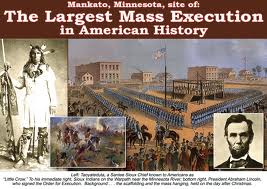
1862 – More than 300 Santee Sioux were found guilty of raping and murdering Anglo settlers and were sentenced to hang. A month later, President Abraham Lincoln commuted all but 39 of the death sentences. One of the Indians was granted a last-minute reprieve, but the other 38 were hanged simultaneously on December 26 in a mass execution witnessed by a large crowd of approving Minnesotans.
1862 – President Abraham Lincoln removed General George B. McClellan from command of the Army of the Potomac. McClellan ably built the army in the early stages of the war but was a sluggish and paranoid field commander who seemed unable to muster the courage to aggressively engage Confederate General Robert E. Lee’s Army of Northern Virginia.
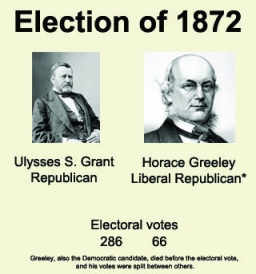
1872 – Ulysses S. Grant easily won re-election as president, defeating Horace Greeley by a large margin in the popular vote and an overwhelming margin in the electoral count. Grant’s electoral total was 286. Greeley’s ticket carried six states and would have received 66 electoral votes but for the fact that Greeley died before the electoral votes were cast. As a result, his votes were divided among four other men.
The election was also the first to have a female presidential candidate: Victoria Woodhull, representing the Equal Rights Party. Her running mate was Frederick Douglass.
1895 – Rochester attorney George Selden won U.S. Patent No. 549,160 for an “improved road engine” powered by a “liquid-hydrocarbon engine of the compression type.” With that, as far as the government was concerned, George Selden had invented the car – though he had never built a single one.
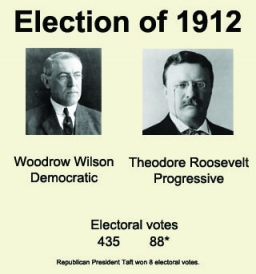
1912 – New Jersey Gov. Woodrow Wilson was elected President of the United States. The Republican National Convention nominated incumbent President William H. Taft for re-election, but fellow Republican (and former President) Theodore Roosevelt left to form his own organization, the Progressive Party (nicknamed the “Bull Moose Party”), and declared himself a candidate for President.
Wilson won a decisive victory, capitalizing on the split Republican vote. Wilson’s 435 electoral votes were the most ever up to that time. Roosevelt finished in second, with 88 votes. Taft won only two states, totaling 8 electoral votes.
1917 – In Buchanan v. Warley, the United States Supreme Court held that a Louisville, Kentucky city ordinance prohibiting the sale of real property to blacks violated the Fourteenth Amendment.
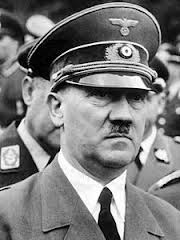
1937 – The Hossbach Memorandum: Adolf Hitler held a secret conference in the Reich Chancellery during which he revealed his plans for the acquisition of “living space” for the German people at the expense of other nations in Europe.
“The history of all ages – the Roman Empire and the British Empire – had proved that expansion could only be carried out by breaking down resistance and taking risks. There had never been spaces without a master.”
Hitler said military action was to be taken by 1943-1945 at the latest, to guard against military obsolescence, the aging of the Nazi movement, and “it was while the rest of the world was still preparing its defenses that we were obliged to take the offensive.”
Following the war, the Hossbach Memorandum was used in the Nuremberg war crimes trials as evidence of conspiracy to wage war, specifically targeting Chief of the Luftwaffe Hermann Göring, one of the attendees at the conference. The memorandum also served to expose the ruthless cynicism of Hitler who repeatedly proclaimed a desire for peace in public, all the while laying out plans for war in Europe.
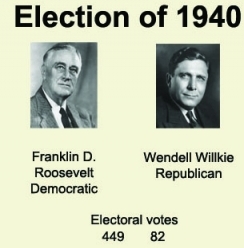
1940 – Breaking with the tradition set by George Washington, President Franklin Delano Roosevelt opted to run for a third term and easily defeated Republican Wendell Willkie.
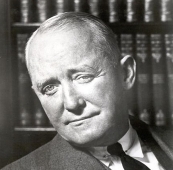
1942 – George M. Cohan (published more than 300 songs during his lifetime, including the standards Over There, Give My Regards To Broadway, Yankee Doodle Dandy and You’re A Grand Old Flag, in addition to writing and producing over 50 Broadway plays) died of cancer at the age of 64.
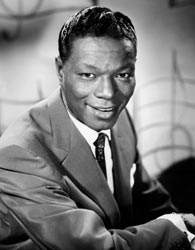
1956 – The Nat King Cole Show debuted on NBC. The variety program was the first of its kind hosted by an African-American, which created controversy at the time. The program was ultimately done in by lack of a national sponsorship, and ended in December 1957 after Cole, not the network, pulled the plug.
Commenting on the lack of sponsorship his show received, Cole quipped, “Madison Avenue is afraid of the dark. The network supported this show from the beginning. They could have dropped it after the first thirteen weeks. Shows that made more money than mine were dropped. They offered me a new time at 7:00 p.m. on Saturdays on a cooperative basis, but I decided not to take it. I feel played out.”
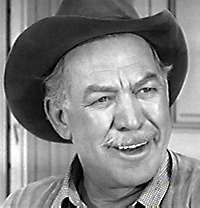
1960 – Ward Bond (appeared in over 200 films, including It’s A Wonderful Life, Gone With The Wind, The Searchers, Sergeant York, Rio Bravo, but also remembered for his role of wagon master Major Seth Adams on Wagon Train) died of a heart attack at the age of 57. John Wayne delivered the eulogy at Bond’s funeral.
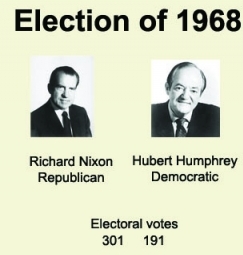
1968 – Former Vice-president Richard Nixon defeated Vice-president Hubert Humphrey to become the 37th President of the United States. The other high-profile candidate was Alabama Gov. George Wallace, who ran on the American Independent ticket; Wallace’s major issue was opposition to racial segregation, which was a very hot topic across the country, especially in Southern states.
In the end, Humphrey wore much of the blame for the continued unrest in the country. Nixon won a close popular vote tally, besting Humphrey by less than 600,000 votes. The electoral difference was starker, with Nixon winning 301-191. Wallace won five southern states and 46 electoral votes.
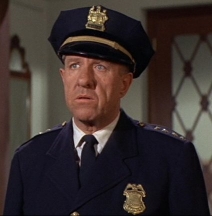
1974 – Stafford Repp (character actor best known for his role as Police Chief O’Hara in the Batman television series) died of a heart attack at the age of 56.
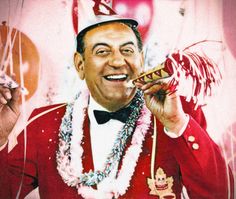
1977 – Guy Lombardo (orchestra leader best known for almost a half-century of New Year’s Eve broadcasts across America) died of a heart attack at the age of 75.

1989 – Barry Sadler (served as a Green Beret combat medic with the U.S. Army in Vietnam and recorded The Ballad of The Green Berets, a #1 song in 1966) died of complications from a gunshot injury suffered in September 1988 in Guatemala. He was 49.
1990 – Meir Kahane, an American-born rabbi and founder of the far-right Kach movement, is shot dead in New York City. Egyptian El Sayyid Nosair was later charged with the murder but acquitted in a state trial. The federal government later decided that the killing was part of a larger terrorist conspiracy and thus claimed the right to retry Nosair. In 1995, he was convicted of killing Kahane during the conspiracy trial of Brooklyn-based Arab militants led by Sheik Omar Abdel-Rahman. Nosair was sentenced to life imprisonment.
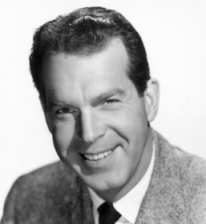
1991 – Fred MacMurray (appeared in more than 100 movies, including Double Indemnity, The Caine Mutiny, and The Apartment, but is best known for his role of Steve Douglas, the widowed father on My Three Sons) died from pneumonia at the age of 83.
1994 – George Foreman, age 45, became boxing’s oldest heavyweight champion when he defeated 26-year-old Michael Moorer in the 10th round of their WBA fight. More than 12,000 spectators at the MGM Grand Hotel in Las Vegas watched Foreman dethrone Moorer, who went into the fight with a 35-0 record.
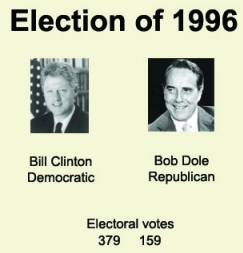
1996 – President Bill Clinton won a second term, besting Kansas Senator Robert Dole, who campaigned on a large across-the-board tax cut. Clinton campaigned on his record of prosperity and bipartisanship.
Billionaire H. Ross Perot ran again as an Independent and won more than eight million votes (but no electoral votes). The popular vote difference between Clinton and Dole was just more than eight million.
2000 – Jimmie Davis (wrote You Are My Sunshine and was a two-term Governor of Louisiana) died of natural causes at the age of 101.
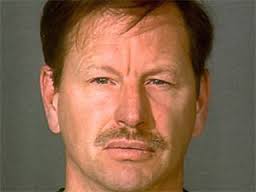
2003 – Gary Ridgway – known as The Green River Killer – avoided the death penalty in King County, Washington by confessing to the murders of 48 women, most of whom were murdered between 1982-84, as part of a plea bargain that spared him execution in exchange for his cooperation in locating the remains of his victims and providing other details.
Over the next few months, Ridgway claimed to have actually murdered 71 victims and told investigators he had talked to and tried to make his victims comfortable before he committed the murders.
In his own words, “I would talk to her… and get her mind off of the, sex, anything she was nervous about. And think, you know, she thinks, ‘Oh, this guy cares’… which I didn’t. I just want to, uh, get her in the vehicle and eventually kill her.”
He is incarcerated at Washington State Penitentiary in Walla Walla, Washington, but here is today’s question:
If a man who murders 48 women doesn’t get the death penalty, then who in hell is eligible for it?
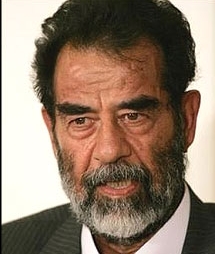
2006 – Saddam Hussein, the former president of Iraq, was found guilty of crimes against humanity and sentenced to death. Specific charges included the murder of 148 people, the torture of women and children, and the illegal arrest of 399 members of the pro Iranian Dawa Party (148 were executed). The verdict and sentencing were both appealed, but subsequently affirmed by Iraq’s Supreme Court of Appeals. Hussein died by hanging on December 30, 2006.
2007 – Members of the Writers Guild of America, East, and Writers Guild of America, West – labor organizations representing television, film and radio writers – went on strike in Los Angeles and New York. The strike’s key issues included the writers’ demand for a larger share of DVD revenues and payment for films and TV shows distributed over the Internet and other forms of new media. Late-night talk shows, which used guild writers, were immediately affected by the strike and went into reruns. Production also shut down on many prime-time comedies and dramas; however, some had stockpiled completed programming and were able to avoid going straight into reruns. The strike – which ended on February 26, 2008 – resulted in a loss of $3 billion, by some estimates, to the Los Angeles economy alone.
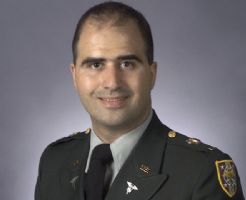
2009 – 13 people were killed and more than 30 others wounded, nearly all of them unarmed soldiers, when a U.S. Army officer went on a shooting rampage at Fort Hood in central Texas. The deadly assault, carried out by Major Nidal Malik Hasan, an Army psychiatrist, was the worst mass murder at a U.S. military installation.
In 2013, Hasan, who was left paralyzed from the waist down as a result of shots fired at him by police attempting to stop his rampage, was tried in military court, where he acted as his own attorney. During his opening statement, he admitted he was the shooter. (Hasan had previously told a judge that in an effort to protect Muslims and Taliban leaders in Afghanistan, he had gunned down the soldiers at Fort Hood who were being deployed to that nation.) For the rest of the trial, Hasan called no witnesses, presented scant evidence and made no closing argument. On August 23, 2013, a jury found Hasan guilty of 45 counts of premeditated murder and attempted premeditated murder, and he later was sentenced to death for his crimes.

2010 – Jill Clayburgh (twice nominated for a Best Actress Academy Award; An Unmarried Woman and Starting Over) died from leukemia at the age of 66.
Compiled by Ray Lemire ©2014 RayLemire.com. All Rights Reserved.
You may not, under any circumstances, reproduce, record, publish, republish, post, transmit, publicly display, publicly exhibit or distribute any articles or photographs on RayLemire.com without obtaining the express written consent of the Operator.